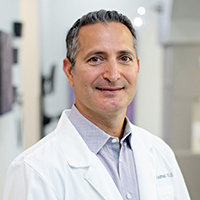Endodontist vs General Dentist
If your dentist refers you to an endodontist in Charlotte, it is probably because you have a painful condition that needs a required level of dental care. The most common procedure performed by an endodontist is a non-surgical root canal, but other procedures might include endodontic surgery, endodontic retreatment, or treating cracked teeth and traumatic injuries. You might wonder why your dentist does not perform these procedures. Here’s the thing – they often rely on their professional judgment to determine if your specific dental condition would best benefit from endodontic care.
So, what do you need to know about the main differences and similarities of a dentist vs. endodontist? Let’s take a look at a few key areas.
What Procedures Do Endodontist Perform?
Dental Education
Both dental professionals attend dental school to learn the fundamentals of tooth, gum and jaw care, but an endodontist will then go on for at least two more years, and sometimes more. In those additional two years, endodontists go through continued training which focuses specifically on diagnosing and treating conditions that affect the tooth pulp (the center of your teeth) and the tissue that surrounds the roots of your teeth.
Practice Focus
A dentist is focusing on dental hygiene, routine dental care, and preventing tooth pain. An endodontist, on the hand, is focused on eliminating tooth pain and returning your mouth to a healthy state. Because of their unique practice focuses, each professional takes a different approach to managing the daily patient flow. The dentist will usually schedule numerous patients in a densely-packed schedule for routine examinations, fillings, and basic dental procedures. If a patient has a dental emergency, he is she needs to be “fit into” the schedule.
An endodontist works primarily on the knowledge that most patients are already in pain and schedules accordingly. More appointment slots are available for emergency care, and longer appointments can be accommodated for more intricate procedures.
Dental Equipment
Unfortunately, dental equipment can be expensive, so a practice has to purchase the technology that is most suited to the widest majority of patient procedures. A dentist may invest money in basic X-ray equipment or one-day crown restorations, while a practice, such as Ballantyne Endodontics, performs all dental procedures under an operating microscope for better visualization and patient outcomes.
We also use Cone Beam 3D technology, which is a piece of specialized imaging equipment that provides clear, three-dimensional images of soft tissue, teeth, nerve pathways and bone in a single scan. These technologies allow your Charlotte endodontist to make a faster and more accurate diagnosis, and to develop a better treatment plan. Our goal is to help retain and preserve the natural foundation of your teeth whenever possible.
Root Canal Treatment
A dentist is able to perform a root canal under certain conditions, but usually does only two or three a week. An endodontist may perform as many as 25 root canals a week, many with very difficult underlying conditions. Patients with an abscess, infection, cracked tooth, or poor gum structure who need a root canal benefit immensely from the expertise of an endodontist.
Effectively cleaning the most complex portions of your root canal system can be a very precise process. Ballantyne Endodontics offers the GentleWave Procedure for this very reason. Often referred to as the “better root canal,” this state-of-the-art root canal treatment provides ultra-cleaning technology that can reach into the microscopic spaces and remove bacteria, debris, and tissue. An endodontist also pays special attention to pain management issues.
We’ve now detailed the differences and similarities between a dentist vs. endodontist and what procedures do endodontist perform. If you need to schedule an appointment with a local endodontist, our team at Ballantyne Endodontics is here to help. Contact us at 704-541-7017 to set an appointment today.

